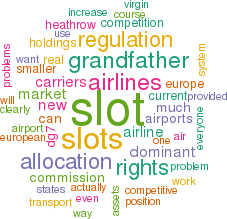Slot Allocation Guidelines
In a resolution, the Airports Council International (ACI) World Annual General Assembly has declared that airport slot allocation policies should support the recovery of air transport.
“Governments and regulators should recognise the Worldwide Airport Slot Guidelines when creating slot allocation policies and we urge capacity-constrained airport operators to define the most. These guidelines are a comprehensive set of procedures for the allocation and management of slot administration. The principal users of these guidelines are airlines, airport coordinators and airport facilitators.
Guidelines for Slot Allocation 2012 Introduction The Guidelines for Slot Allocation (“Guidelines”)1 were introduced in October 2012 with the view to ensure efficient use of infrastructure of, particularly, Level 3 airports in India. For the purpose of slot allocation, airports have been classified into three categories. The airline industry. States’ policies and practices in dealing with the slot allocation issue also vary. Most countries have been applying the IATA system which is presented in the IATA “Worldwide Slot Guidelines (WSG)”; these guidelines contain a set of rules agreed upon by airlines and slot coordinators.
Airport connectivity is essential for the recovery of air transport, and will be a key driver of the wider global economic recovery and ACI World urges airport operators, airlines and slot coordinators to work together and to increase their collaboration in setting and maintaining a harmonized slot allocation process.
Historically, more than 200 airports worldwide have declared insufficient capacity to meet airlines’ demand for flights, especially at peak times and airports may be subject to capacity reduction in the recovery phase of the COVID-19 pandemic because of government regulations, physical infrastructure limitations, or commercial considerations.
ACI World has called upon aviation oversight authorities to recognize the Worldwide Airport Slot Guidelines when designing, implementing and evaluating slot allocation policies and promote an evidence-based and data-driven approach to determine slot policies that support the recovery of air traffic.
“Increased air connectivity will be an important driver of the global economic recovery and it is important that future slot allocation policies do not constrain the industry’s capacity to sustain recovery,” ACI World Director General Luis Felipe de Oliveira said. “While slot allocation policies ensure the most efficient use of available airport capacity and manage airlines’ requests for slots in an orderly manner, the prime objective is to optimize benefits to consumers.
“Governments and regulators should recognise the Worldwide Airport Slot Guidelines when creating slot allocation policies and we urge capacity-constrained airport operators to define the most efficient level of capacity and for airlines to use available capacity to avoid wasting scarce airport capacity.”
The First Edition of the Worldwide Airport Slot Guidelines (WASG) was jointly published by ACI World, the International Air Transport Association, and the Worldwide Airport Slot Coordinators Group (WWACG) on June 1.
Iata Slot Allocation Guidelines

Slot Allocation Guidelines 2020
“We want to promote an evidence-based and data-driven approach to determine slot policies that support the recovery of air traffic,” Luis Felipe de Oliveira said.